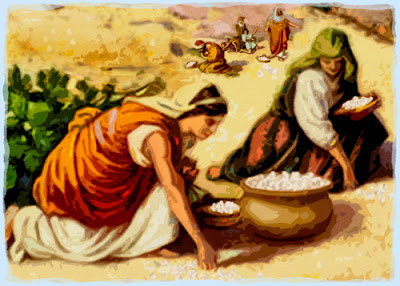TODAY'S SPECIAL: Genesis 28-29;
Psalm 26
TO CHEW ON: Vindicate me O Lord,
For I have walked in my integrity ...
But as for me, I will walk in my integrity ..." Psalm 26:1,11
In this psalm David twice uses the word
integrity—a word we don't run across often in the Bible. He uses it to describe his own life and lifetyle.
[Integrity means (according to my Funk and Wagnalls)
1. Uprightness of character, honesty, probity (virtue or integrity tested and confirmed; strict honesty).
2. The condition or quality of being unimpaired or sound.
3. The state of being complete or undivided.]
The first definition (
uprightness of character, honesty, probity) is most likely the meaning we would think of when we describe someone's life. However, I would suggest that a life lived that way leads to a life and reputation that would embody the other aspects of integrity as well (i.e. a life
unimpaired, sound, complete, and undivided).
David gives us some clues in this psalm about how he conducted his life so it would have integrity. Perhaps we can pick up some pointers from him about how we too can live that way.
1. David lived with the consciousness that God sees everything.
David, it seems, had dealt with secret and public matters in his life to the extent that he was confident in inviting God's scrutiny (Psalm 26:1-3). This is surely the attitude of someone with no skeletons in his closet.
Have we cultivated such a clear conscience before God and people?
2. David was intentional about the company he kept.
He avoided spending time with hypocrites, evildoers, the wicked, and people who worshiped idols (Psalm 26:4-5). He was not naive about his own susceptibility to corruption and didn't want to end up with the corrupters (Psalm 26:9-10).
Though Jesus' great assignment gives us a reason to spend time with non-believers, and He Himself was a loving example of this, I believe we need to be as intentional about the company we keep as David was. The company we keep also includes the movies and TV we watch, the books, magazines, and online content we read.
3. He voiced his praise and thanksgiving.
David's guilt-free living ("
I will wash my hands in innocence" - Psalm 26:6) expressed itself in praise and thanksgiving to God (Psalm 26:7).
What we express in words and song, even if at first half-hearted, is bolstered even as we speak and sing the words.
4. David loved to spend time in God's house and with fellow believers.
The fact that David loved God's presence is another witness to his integrity. He would not have been able to bask in God's glory (Psalm 26:8) if his life had been full of known sin. The "
congregation" gave him a safe place to identify with like-minded people and encourage them with his presence and the aroma of his relationship with God (Psalm 26:12).
Our desire to attend church (whether that's going to a building or just being with fellow believers wherever) and spend time with other Christians can be both an evidence of our integrity and a way to reinforce it (with mutual encouragement and example).
Can we say with David,
"I have walked in integrity .... I will walk in my integrity"? If not, let's make the integrity of our lives a matter of attention today.
PRAYER: Dear God, thank You for David and his articulate transparency that helps me find ways to examine my own life. I pray with him, "Search me, O God .... Try me .... see if there is any wicked way in me, and lead me in the way everlasting" (Psalm 139:23-24). Amen.
Psalm to pray: Psalm 26
MORE: More about integrity
"Keeping your word is the essence of integrity," says Michael Hyatt (former CEO of Thomas Nelson Publishing) in the blog post "Keeping Your Word." He goes on,
"As Stephen Covey points out, 'honesty is making your words conform to reality. Integrity is making reality conform to your words.' It is essential to leadership. Without it, you cannot be an effective leader."
Read all of "
Keeping Your Word" to discover the organic link between integrity and leadership.
*************
Unless otherwise noted all Scripture quotations are taken from the New King James Version®. Copyright © 1982 by Thomas Nelson, Inc. Used by permission. All rights reserved.



















